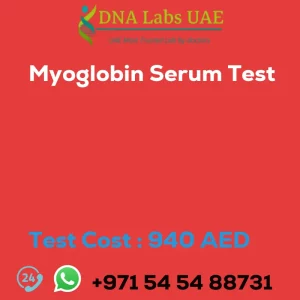HLA – B7 B*07 Test
Test Cost: AED 1010.0
Symptoms, Diagnosis, and Referring Details
Test Name: HLA – B7 B*07 Test
Components:
- Price: 1010.0 AED
Sample Condition: 4 mL (3 mL min.) whole blood in 1 Lavender Top (EDTA) tube OR 6 mL (3 mL min.) whole blood in 1 Yellow Top (ACD) tube. Ship refrigerated. DO NOT FREEZE.
Report Delivery: 10-12 days
Method: Reverse SSOP – Luminex
Test Type: Disease Association
Doctor: Physician, Rheumatologist
Test Department:
Pre Test Information: No special preparation required
Test Details:
The HLA-B7 (B*07) test is a genetic test that detects the presence of the HLA-B7 gene variant in an individual’s DNA. HLA-B7 is a specific subtype of the human leukocyte antigen (HLA) gene, which plays a crucial role in the immune system. The HLA system is responsible for identifying foreign substances, such as bacteria or viruses, and triggering an immune response to eliminate them. HLA genes are highly polymorphic, meaning they have many different variants or alleles. These genetic variations can affect the body’s ability to recognize and respond to foreign invaders.
HLA-B7 is one of the many HLA gene variants that have been identified. It is associated with certain autoimmune diseases, such as ankylosing spondylitis, psoriasis, and autoimmune hepatitis. Additionally, HLA-B7 has been linked to an increased risk of developing certain viral infections, such as Epstein-Barr virus (EBV) and HIV.
The HLA-B7 test is typically performed using a blood sample or buccal swab. The sample is analyzed in a laboratory to determine the presence or absence of the HLA-B7 allele. The results of the test can help healthcare professionals in diagnosing certain autoimmune diseases and predicting the risk of developing certain viral infections.
It is important to note that the presence of HLA-B7 does not guarantee the development of a specific disease or infection. The test results should be interpreted in conjunction with other clinical and laboratory findings to make an accurate diagnosis or assessment of disease risk. Genetic counseling may be recommended to discuss the implications of the test results and any potential treatment options or preventive measures.
| Test Name | HLA – B7 B*07 Test |
|---|---|
| Components | |
| Price | 1010.0 AED |
| Sample Condition | 4 mL (3 mL min.) whole blood in 1 Lavender Top (EDTA) tube OR6 mL (3 mL min.) whole blood in 1 Yellow Top (ACD) tube. Ship refrigerated. DO NOT FREEZE. |
| Report Delivery | 10-12 days |
| Method | Reverse SSOP – Luminex |
| Test type | Disease Association |
| Doctor | Physician, Rheumatologist |
| Test Department: | |
| Pre Test Information | No special preparation required |
| Test Details |
The HLA-B7 (B*07) test is a genetic test that detects the presence of the HLA-B7 gene variant in an individual’s DNA. HLA-B7 is a specific subtype of the human leukocyte antigen (HLA) gene, which plays a crucial role in the immune system. The HLA system is responsible for identifying foreign substances, such as bacteria or viruses, and triggering an immune response to eliminate them. HLA genes are highly polymorphic, meaning they have many different variants or alleles. These genetic variations can affect the body’s ability to recognize and respond to foreign invaders. HLA-B7 is one of the many HLA gene variants that have been identified. It is associated with certain autoimmune diseases, such as ankylosing spondylitis, psoriasis, and autoimmune hepatitis. Additionally, HLA-B7 has been linked to an increased risk of developing certain viral infections, such as Epstein-Barr virus (EBV) and HIV. The HLA-B7 test is typically performed using a blood sample or buccal swab. The sample is analyzed in a laboratory to determine the presence or absence of the HLA-B7 allele. The results of the test can help healthcare professionals in diagnosing certain autoimmune diseases and predicting the risk of developing certain viral infections. It is important to note that the presence of HLA-B7 does not guarantee the development of a specific disease or infection. The test results should be interpreted in conjunction with other clinical and laboratory findings to make an accurate diagnosis or assessment of disease risk. Genetic counseling may be recommended to discuss the implications of the test results and any potential treatment options or preventive measures. |








